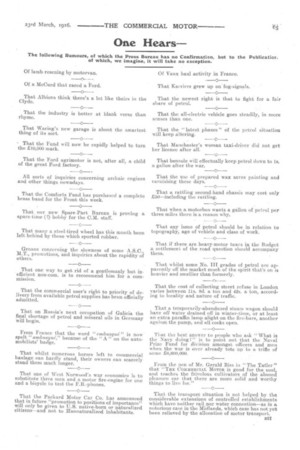One Hears— The following Rumours, of which the Press Bureau
Page 3

If you've noticed an error in this article please click here to report it so we can fix it.
has no Confirmation, but to the Publication of which, we imagine, it will take no exception.
Of lamb-rescuing by motorvan. Of a McCurd that raced a Ford.
That Albions think there's a lot like theirs in the Clyde.
That the industry is better at blank verse than rhyme.
That Waring's new garage is about the smartest thing of its sort.
• That the Fund will now be rapidly helped to turn the 210,000 mark.
That the Ford agrimotor is not, after all, a child of the great Ford factory.
All sorts of inquiries concerning archaic engines and other things nowadays.
That the Comforts Fund has purchased a complete brass band for the Front this week.
That our new Spare-Part Bureau is proving a spare-time (?) bobby for the C.M. staff.
That many a steel-tired wheel has this month been left behind by those which sported rubber.
Groans concerning the slowness of some A.S.C., MT., promotions, and inquiries about the rapidity of others.
That one way to get rid of a gentlemanly but inefficient non-com, is to recommend him for a commission.
That the commercial user's right to priority of delivery from available petrol supplies has been officially admitted.
That on Russia's next occupation of Galicia the final shortage of petrol and mineral oils in Germany will begin.
From France that the word "aniblisq/a " is now spelt "ambusque," because of the " A " on the automobilists' badge.
That whilst numerous horses left to commercial haulage can hardly stand, their owners can scarcely stand them much longer.
That one of West Norwood's war economies is to substitute three men and a motor fire-engine for one and a bicycle to test the F.B.-phones.
That the Packard Motor Car Co. has announced that in future "promotion to positions of importance" will only be given to -U.S. native-born or naturalized citizens—and not to Hunnaturalized inhabitants. Of Vaux haul activity in France. That Karriers grew up on.fog-signals.
That the newest right is that to fight for a fair share of petrol.
That the all-electric vehicle goes steadily, in more senses than one.
That the "latest phases" of the petrol situation will keep altering.
That Manchester's woman taxi-driver did not get her licence after all.
That benzole will effectually keep petrol down to la a gallon after the war.
That the use of prepared wax saves painting and varnishing these days.
That a rattling second-hand chassis may cost only 250—including the rattling.
That when a motorbus wants a gallon of petrol per three miles there is a reason why.
That any issue of petrol should be in relation to topography, age of vehicle and class of work.
That if there are heavy-motor taxes in the Budget a settlement of the road question should accompany them.
That whilst some No. III grades of petrol are apparently off the market much of the spirit that's on la heavier and smellier than formerly.
That the cost of collecting street refuse in London varies between us. 8d. a ton and 42s. a ton, according to locality and nature of traffic.
That a temporarily-abandoned steam wagon should have all water drained off in winter-time,, or at least an extra paraffin lamp alight on the fire-bars, another against-the pump, and all cocks open.
That the best answer to people who ask "What is the Navy doing?" is to point out that the Naval Prize Fund for division amongst officers and men when the war is over already tots up to a trifle of some 26,600,000.
From the pen of Mr. Gerald Biss in "The Tatler" that "T (20-41.1MERCIATi MOTOR. is good for the soul, and teaches the frivolous cultivators of the abused pleasure car that there are more solid and worthy things to live for."
That the transport. situation is not helped by the considerable extensions of controlled establishments which have neither rail nor water connection—as in a notorious case in the Midlands, which case has not yet been relieved by the allocation of motor transport.




















